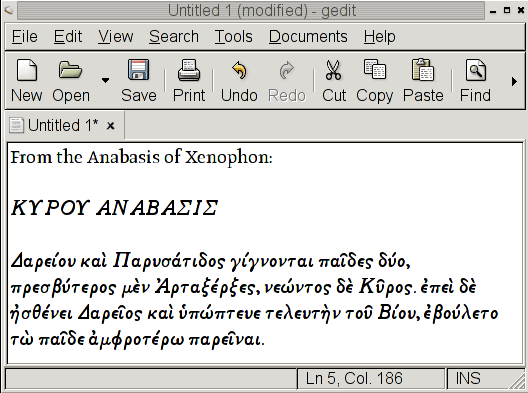
im-classicalgreek is an input method for GTK2 which allows entering text in classical Greek with all possible combination of diacritics and characters though an easy to learn keyboard system.
The developer of im-classicalgreek is Christopher Culver, crculver /at/ users.sourceforge.net
| key | Greek |
|---|---|
| a | alpha α |
| b | beta β |
| g | gamma γ |
| d | delta δ |
| e | epsilon ε |
| z | zeta ν |
| q | eta η |
| th | theta θ |
| i | iota ι |
| k | kappa κ |
| l | lambda λ |
| m | mu μ |
| n or v | nu ν |
| x | xi ξ |
| o | omicron ο |
| p | pi π |
| r | rho ρ |
| s | sigma σ |
| c | final sigma ς |
| t | tau τ |
| u | upsilon υ |
| ps | psi ψ |
| f or ph | phi φ |
| ch | chi χ |
| w | omega ω |
The breathing is entered before the vowel:
| key | Greek |
|---|---|
| j | smooth breathing, e.g. ἀ |
| h | rough breathing, e.g. ἁ |
Iota subscript is written by typing y after the vowel:
| key | Greek |
|---|---|
| y | iota subscript, e.g. ᾁ |
Finally, after entering the breathing (if any), the vowel, and the iota subscript (if any), accents may be added:
| key | Greek |
|---|---|
| ' | acute accent (oxia), e.g. ά |
| ` | grave accent (varia), e.g. ὰ |
| ~ | circumflex accent (perispomeni), e.g. ᾶ |
| _ | macron, e.g. ᾱ |
For alpha with rough breathing, iota subscript, and an acute accent type: h a y `
For u with a circumflex accent, type: u ~
For the word Σώκρατες (Socrates): S w ' k r p a t e c
Greek text entered in gedit using the Porson font

Download the latest version of im-classicalgreek from Sourceforge
To download im-classicalgreek from CVS open a terminal and enter:
$ cvs -d:pserver:anonymous@cvs.sourceforge.net:/cvsroot/im-classgreek checkout im-classgreek
Run ./autogen.sh and your package should be read for configuration and installation.
CGreek provides similar classical Greek input in GNU Emacs.
gucharmap is a Unicode character map for GTK2, useful for finding all kinds of characters of many different scripts.
The Porson font (zipped TTF font file) is an attractive typeface, based on the version originally cut from a transcript of Euripides' Medea in the hand of the preeminent nineteenth century classical scholar Richard Porson, of Cambridge
The New Athena Unicode font (zipped TTF font file) offers a more modern look.